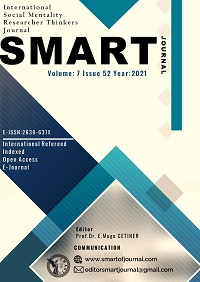Author :
Abstract
Arap dilinin temel hedefleri kendine özgü farklı sınıflarına rağmen çoğunlukla harflerin manaları üzerine mebni olması tüm azmi ve gayreti harflerden müteşekkil olan cümleleri öğrenmeye yönlendirmiştir. Cümleleri oluşturan ise hiç şüphesiz kelimelerdir. Kelimeler, önlerine gelen ve “hurûf-u meâni” mana harfleri diye adlandırılan edatların cümleye kattığı anlamlarla tam ve kesin yargı içeren manayı okuyucuya aktarırlar. Belâgat ve fesâhetiyle kelâmların en yücesi olan Kur’an-ı Kerim’de “hurûf-u meânî” olarak adlandırılan edatlarla başlayan âyetler, farklı surelerde ve farklı anlamlarla zengin bir şekilde yer almaktadır. Meânî harflerinden biri de لَيْسَ “Leyse” edatıdır. Söz konusu edat, çeşitliliği ve farklı anlamlarıyla birçok gramer eserinde nahiv âlimlerinin ittifak ve ihtilaflarına mazhar olmuştur. Bu çalışmamızda söz konusu edatın Arap dilindeki farklı anlamları, çeşitleri, harf veya isim olup olmadığı hakkındaki ihtilaflar, başında geldiği kelimelere kattığı anlamlar, başka edatlarla kullanılıp kullanılmadığı gibi durumlar ele alınacaktır. Bununla beraber mezkûr edatın Kur’an’daki farklı kullanımları; kaç defa hangi surede ve âyette geçtiği, başında olduğu âyetlerde nasıl kullanıldığı, cümleye yansıttığı faklı anlamlar çerçevesinde edatın geçtiği âyetlerin meâli ve geçtiği sure isimleri maddeler halinde zikredilecektir.
Keywords
Abstract
In spite of a unique class of the basic goals of the Arabic language, mostly on the meanings of the letters are composed of sentences that all have to learn letters mebni perseverance and effort is directed. No doubt these are the words that constitute sentences. Words, coming in front of them and “syllable-u syntax” meaning giving a definitive meaning to the sentence containing the letters called prepositions, complete with judgment and convey meaning to the reader. Eloquence and fesahet with the truth of the word of the Holy Quran “insyllable-u syntaxcalled” prepositions that begin with versesin different times with different meanings and is rich in a manner that is located. Syntax one of the letters لَيْسَ “, if my lady” is a preposition. The preposition in question, with many different meanings and grammatical diversity of his work has been honored in the alliance and the conflicts of the scholars of grammar. In this study, different meanings of the preposition in the Arabic language in question, types, disputes about whether a letter or giving meaning to the words at the beginning of a noun, and is used with other prepositions such as whether or not the situations will be handled. However, the different uses of the preposition aforementioned of the Qur'an; how many times and in whose verse formation, where at the beginning of the verses in how it is used, the occurrence of the preposition in the sentence context to reflect different meanings of verses purport, and the time of occurrence, the names will be mentioned in the article.
Keywords
- Behcet Abdülvahid Salih, el-İ‘rabü’l-Mufassal li-Kitâbillahi’l-Mürettel, Ammân: Dâru’l-Fikr, 1993.
- Behcet Abdülvahid Salih, el-İ‘rabü’l-Mufassal li-Kitâbillahi’l-Mürettel, Ammân: Dâru’l-Fikr, 1993.
- Diyanet İşleri Başkanlığı, Dini Yayınlar Dairesi Başkanlığı, Kur’ân Yolu Meali ve Tefsiri, Ankara: Saray Matabaacılık Ltd. Şti. 2007.
- Durmuş, İsmail “Harf”, DİA, Ankara: TDV Yayınları, 1988. 157 Nisâ suresi: 4/176.
- 158 En‘âm: 6/89.160 Meâric: 70/2.Emîn, Ahmed, Fecrü’l-İslâm (trc. Ahmet Serdaroğlu), Ankara: Kılıç Kitabevi, 1976.
- Ebû Hayyân, Muhammed b. Yûsuf b. Alî b. Yûsuf b. Hayyân el-Endelüsî, İrtişâfü’d-Darab min Lisâni’l- ‘Arab, Thk. Mustafa Ahmed en-Nemâs, Kahire: Matbaatü’l-Medenî, 1987.
- Halîl b. Ahmed, Ebû Abdirrahmân el-Halîl b. Ahmed b. Amr b. Temîm el-Ferâhîdî, Kitâbü’l-ʿAyn, Beyrut: nşr. Mehdî el-Mahzûmî, 1988.
- el-Hudarî, Muhammed b. Afîfî el-Bâcûrî, Hâşiyetu’l-Hudarî ‘âlâ Şerhi İbn Akil, Beyrut: Dâru’l-Fikr, 1981.İbn Mâlik, Ebû Abdillâh Cemâlüddîn Muhammed b. Abdillâh b. Mâlik et-Tâî el-Endelüsî el-Ceyyânî, Şerhu’t-Teshîli’l-Fevâid ve Tekmîli’l-Makâsıd, Thk. Abdurrahman es-Seyyid, Kahire: Dâru Hicr, 1990.
- İbn Hişâm, Ebû Muhammed Cemâlüddîn Abdullâh b. Yûsuf b. Ahmed b. Abdillâh el-Ensârî el-Mısrî, Muğni’l-Lebîb ‘an Kutübi’l-E‘ârîb, Thk. Muhammed Abdül-Latîf, Kuveyt: Silsiletu’t-Turâsiyye, 2000.
- İbn Hişâm, Şerh-u Katri’n-Nedâ ve Belli’s-Sadâ, Thk. Muhammed Muhyiddin Abdu’l-Hamîd, Beyrut: Dâru’l-Fikr, 2009.
- İbn ‘Usfûr, Ebü’l-Hasen Alî b. Mü’min b. Muhammed b. Alî el-Hadramî el-İşbîlî en-Nahvî, Şerhu’l-Cümel li’z-Zeccâcî, Thk. Abdurrahman Seyyid, Beyrut: Mektebetü’l-Enclû el-Mısriyye, 1974.
- Hadramî el-Mağribî et-Tûnisî, Mukaddime, çevr, Zâkir Kadiri Ugan, Ankara: Milli Eğitim Gençlik ve Spor Bakanlığı, 1986.
- İbn Yaîş b. Muhammed el-Esedî el-Halebî, Şerhu’l-Mufassal, Beyrut: Dâru’l-Kutubi’l-‘İlmiyye, 2001.
- el-Kefevî, Ebu’l-Bekâ Eyyûb b. Mûsâ, el-Kulliyyât, Thk. Adnân Dervîş-Muhammed Mısrî, Beyrut: Müessesetü’r-Risâle, 2018.
- M. Çetin, Nihad “Arap”, DİA, Ankara: TDV Yayınları, 1991.
- el-Murâdî, Ebû Ca‘fer Ahmed b. Muhammed b. İsmâîl el-Mısrî, el-Cene’d-Dânî fî Hurûfi’l-Me‘âni, Beyrut: Dâru’l-Kutubi’l-‘İlmiyye, 2016.
- el-Müberred, Ebü’l-Abbâs Muhammed b. Yezîd b. Abdi’l-ekber b. Umeyr el-Ezdî es-Sümâlî, el-Muktedâb, Kahire: Vizâretu’l-Evkâf, 1994.
